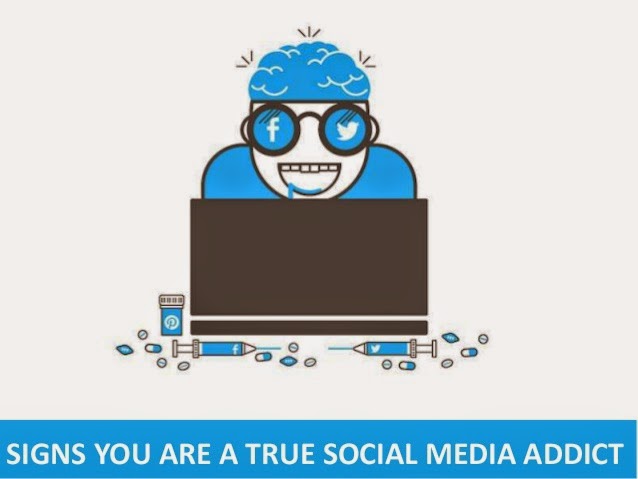Yes? No?
Social media – as most media – is habit forming. You start at first innocently & soon its a daily routine. You keep going back to check the latest trend, those pictures of your crush, that new video release..and soon it starts to mess up with your daily life. Your relationship is now in the back seat, since you have to constantly keep up with, the Kardashians, check out Rihannas latest instagram posting etc..
Check out the below stats on the social media usage adopted from Brent Matsalla of guardianlv dot com; by Jordan H. Green
Amazing or what and still growing with each day.
Jordan H. Green on guardianlv dot com continues to validate the addictive effects of social media by referring to a recent Harvard University study that showed that disclosing personal information activates the same part of the brain that gives pleasure when a person enjoys good food, receiving money or having sex. Although the actual sensation between all of these is different, the study tells one that the human brain considers sharing experiences a pleasurable one – and part of being human is to constantly seek things which gives much pleasure.
Social media addicts become addicted not to the actual act of tweeting, friending, poking or posting, rather, they become addicted to the pleasure derived from those actions.
You need
Some common warning signs and symptoms of social media addiction:
- Lost Time – Do they lose track of time? Do they frequently find themselves online longer than they intended to be? Does a few minutes turn into a few hours? Do they get irritated or upset if their time online is interrupted?
- Other Tasks Don’t Get Done – Do they skip meals to stay online? Does laundry or other chores not get done? Do they stay up late online, when they do already know they need to go to bed for an early day? Do they miss appointments, meetings, or constantly run late because they spent too much time online?
- Isolation – Do they feel nobody in the real world understands them? Do they think their online friends are more important than those they have known for a long time in the real world? Have they got into arguments or even broken up with their spouse or partner because of the amount of time they spend online? Are they neglecting their family and friends because the people they interact with online seem more “real?”
- Guilty or Defensive Feelings – Do they feel guilty or get defensive about their social media habits? Are they sick of their spouse nagging them to get off the computer, or to put their smartphone down? Have they ever hidden or lied to their family and friends about what they were doing, to avoid getting nagged about their social media use? Have they ever lied or hid their social media use from their boss? Do they tend to feel guilty or shameful when others approach them while they are online?
- Nothing Beats Social Media – Do they feel a sense of euphoria while online? Have they ever used social media for sexual gratification or excitement? Do they use the Internet when they are stressed out, sad, or otherwise unhappy, to give them joy? Have they tried to limit their social media time, but failed?
- Physical Symptoms of Social Media Addiction – Do they suffer from Carpal Tunnel Syndrome, dry eyes/eye strain, back aches/neck aches, severe headaches, lack of sleep, pronounced weight loss or gain?
And the solution..maybe..
Right now – today – they can do any of the following to break their social media addiction:
- Find the Cause – Think about why they get so much pleasure out of social media. Usually, there is an underlying problem which they are escaping from by using something else – such as drugs, alcohol, or in this case – social media.
- Seek Support – Once they've figured out the underlying cause, talk to a professional therapist. They can also help them find the underlying cause too.
- Build Real Supportive Relationships – The more relationships they have in the real world, the less they’ll need to rely on the Internet and social media for interaction. Set aside time for friends and family. Join local groups and clubs which they share a common interest, such as book clubs, sports teams, or other such organizations. This way, they’ll build real relationships naturally in the real world.
- Limit Internet Use – Keep track of their social media use, log how long they stay online. Over time, set specific time limits and times when they can access the Internet, and stick to those times. Start with broad large blocks of time at first, and GRADUALLY reduce the time online. Set goals throughout the day for accomplishing in the real world, and use the Internet time as a reward for completing that goal.
Good luck in conquering the social media addiction. Remember – one is not alone.




.jpg)
.jpg)
.jpg)
No comments:
Post a Comment